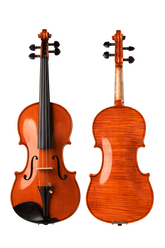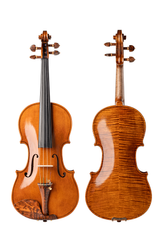Handmade vs Factory-made Violins: What's the Real Difference in 2025?
If you’re in the market for a new violin, one of the biggest decisions you’ll face is whether to invest in a handmade violin or go with a more affordable factory-made option. While they may look similar from the outside, the differences in craftsmanship, sound, price, and long-term value are significant.
In this 2025 guide, we’ll break down the key differences between handmade and factory-made violins to help you choose the right one for your needs.
What Is a Handmade Violin?
A handmade violin is crafted by a skilled luthier, often working alone or in a small workshop. Every piece of wood is selected with care, shaped by hand, and assembled with deep knowledge of acoustics and traditional techniques.
Key characteristics:
-
Individually carved top, back, and scroll
-
Aged tonewoods (spruce for the top, maple for the back and sides)
-
Oil or spirit varnish applied by hand
-
Each instrument has its own unique tone and personality
A handmade violin is not just an instrument — it’s a work of art, often signed or labeled by the maker.
What Is a Factory-made Violin?
Factory-made violins are mass-produced in workshops where many workers each handle a small part of the process. These violins are built for speed and efficiency, often with less attention to detail.
Typical traits:
-
Assembly-line production with CNC machines or molds
-
Woods may not be aged properly
-
Varnish and setup are quickly applied or done by machine
-
Most are designed to look good on the outside, but may lack in sound quality
Some factory violins can be decent for beginners, especially when professionally set up, but they rarely offer the depth and projection that handmade violins provide.
Key Differences Between Handmade and Factory-made Violins
| Feature | Handmade Violin | Factory-made Violin |
|---|---|---|
| Craftsmanship | Built by a single luthier with care | Assembled by many workers, often by machine |
| Sound Quality | Rich, warm, responsive tone | Often dull or thin without proper setup |
| Materials | Carefully aged spruce & maple | Less-aged or lower-quality wood |
| Setup | Adjusted by professional luthiers | Often basic or not optimized |
| Price | Higher upfront, but better value | Lower initial cost |
| Longevity | Improves with age and playing | May degrade or wear out faster |
| Resale Value | Can increase over time | Typically decreases in value |
Which One Is Right for You?
Here’s how to choose between the two:
-
🎻 Beginner or short-term use?
A well-setup factory violin may be sufficient — especially for casual learners or children just starting out. -
🎵 Serious student or performer?
A handmade violin will give you greater tonal range, projection, and room to grow musically. -
💡 Planning long-term?
Handmade violins often hold their value and become family heirlooms. You’re investing in more than a product — you’re buying character and craftsmanship.
Real Example: Why Fiddlover Handmade Violins Stand Out
At Fiddlover Violin Shop, we specialize in affordable handmade violins that bridge the gap between quality and price. Take our popular Handmade Fine Violin Series, for example:
-
Hand-carved by experienced luthiers
-
Aged tonewoods (Alpine spruce top, flamed maple back)
-
Set up and tested by professional players
-
Responsive, warm tone perfect for intermediate to advanced students
👉 Explore the Fiddlover Fine Violin
We believe every violinist deserves an instrument that inspires them.
Final Thoughts
Choosing between a handmade and a factory-made violin comes down to your musical goals, budget, and expectations. While factory violins are fine for some beginners, the depth, richness, and craftsmanship of a handmade violin offer lasting value.
At Fiddlover, we offer both — but every violin we sell is carefully selected, adjusted, and quality-checked by our team. Whether you're buying your first violin or upgrading to a handmade one, we’re here to help you find the right match.
📆 Need help choosing? Contact us anytime for personalized recommendations or explore our violin collection online.






1 comment
At Fiddlover, we offer both — but every violin we sell is carefully selected, adjusted, and quality-checked by our team